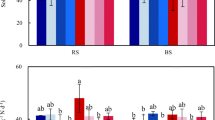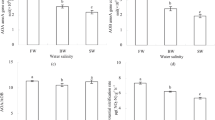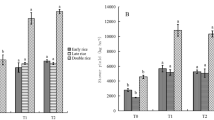Abstract
This study aimed to evaluate the short-term effects of irrigation with diluted fish-processing effluents on soil pH, electrical conductivity, nitrification rate and abundance of ammonia oxidizers. To accomplish that, we constructed microcosms of soil from an undisturbed arid ecosystem of Patagonia, and irrigated them for 2 months with diluted effluents from a fish-processing factory or with water as control. In the initial soil sample, and along the experiment, we determined soil pH, electrical conductivity, and the concentration of inorganic nitrogen forms, which we used to calculate the net nitrification rate. We further estimated the abundances of ammonia-oxidizing archaea and bacteria in the initial soil sample and at the end of the experiment, by qPCR of amoA genes. Soil pH decreased and electrical conductivity increased in both irrigation treatments, although the effect was higher in effluent-irrigated microcosms. Soil nitrate + nitrite concentration, and thus the nitrification rate, was higher in effluent than in water-irrigated microcosms. The abundance of archaeal amoA genes was higher under effluent than water-irrigation, but that of bacterial amoA genes did not vary significantly between treatments. Neither ammonia-oxidizing archaea nor bacteria were influenced by the changes in soil pH and electrical conductivity induced by effluent irrigation.


Similar content being viewed by others
Data availability
The data that support the findings of this study are available from the corresponding author on reasonable request.
References
Achuthan C, Rejish Kumar VJ, Manju NJ et al (2006) Development of nitrifying bacterial consortia for immobilizing in nitrifying bioreactors designed for penaeid and non-penaeid larval rearing systems in the tropics. Indian J Mar Sci 35:240–248
Allison LE, Moodie CD (1965) Carbonate. In: Norman AG (ed) Methods of soil analysis: part 2 chemical and microbiological properties. American Society of Agronomy Inc, Madison, pp 1379–1396
Allison LE, Richards LA (1954) Diagnosis and improvement of saline and alkali soils. No. 60. Soil and Water Conservative Research Branch, Agricultural Research Service, US Department of Agriculture, Washington D.C., USA
APHA, AWWA, WEF (2017) Standard methods for the examination of water and wastewater, 23rd edn. American Public Health Association, American Water Works Association, Water Environment Federation, Washington
Ayers RS, Westcot DW (1994) Water quality for agriculture. FAO. Irrigation and drainage paper 29. Rome
Banning NC, Maccarone LD, Fisk LM, Murphy DV (2015) Ammonia-oxidising bacteria not archaea dominate nitrification activity in semi-arid agricultural soil. Sci Rep 5:11146. https://doi.org/10.1038/srep11146
Becerra-Castro C, Lopes AR, Vaz-Moreira I et al (2015) Wastewater reuse in irrigation: a microbiological perspective on implications in soil fertility and human and environmental health. Environ Int 75:117–135. https://doi.org/10.1016/j.envint.2014.11.001
Bedbabis S, Ben Rouina B, Boukhris M, Ferrara G (2014) Effect of irrigation with treated wastewater on soil chemical properties and infiltration rate. J Environ Manag 133:45–50. https://doi.org/10.1016/j.jenvman.2013.11.007
Bisigato AJ, Bertiller MB (1997) Grazing effects on patchy dryland vegetation in northern Patagonia. J Arid Environ 36:639–653. https://doi.org/10.1006/jare.1996.0247
Blumenthal UJ, Duncan Mara D, Peasey A et al (2000) Guidelines for the microbiological quality of treated wastewater used in agriculture: recommendations for revising WHO guidelines. B World Health Organ 78:1104–1116. https://doi.org/10.1590/S0042-96862000000900006
Bollmann A, French E, Laanbroek HJ (2011) Isolation, cultivation, and characterization of ammonia-oxidizing bacteria and archaea adapted to low ammonium concentrations. In: Klotz MG (ed.). Methods in enzymology, Vol. 486. Research on nitrification and related processes, part A. pp 55–88
Bouyoucos GJ (1962) Hydrometer method improved for making particle size analyses of soils. Agron J 54:464–465. https://doi.org/10.2134/agronj1962.00021962005400050028x
Chen L, Feng Q, Li C et al (2017) Impacts of aquaculture wastewater irrigation on soil microbial functional diversity and community structure in arid regions. Sci Rep 7:11193. https://doi.org/10.1038/s41598-017-11678-z
Ching YC, Redzwan G (2017) Biological treatment of fish processing saline wastewater for reuse as liquid fertilizer. Sustainability 9:1062. https://doi.org/10.3390/su9071062
Cristóvão RO, Botelho CM, Martins RJE et al (2015) Fish canning industry wastewater treatment for water reuse—a case study. J Clean Prod 87:603–612. https://doi.org/10.1016/j.jclepro.2014.10.076
Daims H, Lebedeva EV, Pjevac P et al (2015) Complete nitrification by Nitrospira bacteria. Nature 528:504–509. https://doi.org/10.1038/nature16461
de Melo Ribeiro FH, dos Santos Silva Y, Pena Naval L (2020) Auxiliary strategies for water management in industries: minimization of water use and possibility of recycling and/or reuse of effluent. In: Sabban A (ed.). Innovation in global green technologies 2020. IntechOpen. pp 79–93
Delgado-Baquerizo M, Gallardo A, Wallenstein MD, Maestre FT (2013) Vascular plants mediate the effects of aridity and soil properties on ammonia-oxidizing bacteria and archaea. FEMS Microbiol Ecol 85:273–282. https://doi.org/10.1111/1574-6941.12119
Delgado-Baquerizo M, Maestre FT, Eldridge DJ, Singh BK (2016) Microsite differentiation drives the abundance of soil ammonia oxidizing bacteria along aridity gradients. Front Microbiol 7:505. https://doi.org/10.3389/fmicb.2016.00505
Drury CF, Hart SC, Yang XM (2007) Nitrification techniques for soils. In: Carter MR, Gregorich EG (eds) Soil sampling and methods of analysis, 2nd edn. CRC Press, Boca Raton, pp 495–513
FAO (2014) FAO statistical yearbook 2014. Latin America and the Caribbean food and agriculture. Santiago
FAO (2020) The state of world fisheries and aquaculture 2020. Sustainability in action. Rome
Francis CA, Roberts KJ, Beman JM et al (2005) Ubiquity and diversity of ammonia-oxidizing archaea in water columns and sediments of the ocean. Proc Natl Acad Sci USA 102:14683–14688. https://doi.org/10.1073/pnas.0506625102
Frenk S, Dag A, Yermiyahu U et al (2015) Seasonal effect and anthropogenic impact on the composition of the active bacterial community in Mediterranean orchard soil. FEMS Microbiol Ecol 91:fiv096. https://doi.org/10.1093/femsec/fiv096
Ganjegunte G, Ulery A, Niu G, Wu Y (2017) Effects of treated municipal wastewater irrigation on soil properties, switchgrass biomass production and quality under arid climate. Ind Crops Prod 99:60–69. https://doi.org/10.1016/j.indcrop.2017.01.038
Guimarães JT, Souza ALM, Brígida AIS et al (2018) Quantification and characterization of effluents from the seafood processing industry aiming at water reuse: a pilot study. J Water Process Eng 26:138–145. https://doi.org/10.1016/j.jwpe.2018.10.006
Guo H, Ma L, Liang Y et al (2020) Response of ammonia-oxidizing Bacteria and Archaea to long-term saline water irrigation in alluvial grey desert soils. Sci Rep 10:489. https://doi.org/10.1038/s41598-019-57402-x
Gwon BG, Kim JK (2012) Feasibility study on production of liquid fertilizer in a 1 m3 reactor using fishmeal wastewater for commercialization. Environ Eng Res 17:3–8. https://doi.org/10.4491/eer.2012.17.1.003
Haynes RJ, Swift RS (1989) Effect of rewetting air-dried soils on pH and accumulation of mineral nitrogen. J Soil Sci 40:341–347. https://doi.org/10.1111/j.1365-2389.1989.tb01278.x
Hwang S, Hansen CL (1998) Formation of organic acids and ammonia during acidogenesis of trout-processing wastewater. Trans Am Soc Agric Eng 41:151–156. https://doi.org/10.13031/2013.17139
Ibekwe AM, Gonzalez-Rubio A, Suarez DL (2018) Impact of treated wastewater for irrigation on soil microbial communities. Sci Total Environ 622–623:1603–1610. https://doi.org/10.1016/j.scitotenv.2017.10.039
Jung HY, Kim JK (2016) Eco-friendly waste management of mackerel wastewater and enhancement of its reutilization value. Int Biodeterior Biodegrad 111:1–13. https://doi.org/10.1016/j.ibiod.2016.04.002
Keeney DR, Nelson DW (1982) Nitrogen—Inorganic forms. In: Page AL (ed.). Methods of soil analysis, Part 2. Chemical and microbiological properties. American society of agronomy, Inc., and Soil science society of America Inc., Madison, WI, pp 643–698
Keith LH (1996) Compilation of EPA´s sampling and analysis methods, 2nd edn. Lewis publishers, Boca Raton
Koops HP, Purkhold U, Pommerening-Röser A et al (2006) The lithoautotrophic ammonia-oxidizing bacteria. In: Dworkin M, Falkow S, Rosenberg E, Schleifer KH, Stackebrandt E (eds) The prokaryotes. Springer, New York, pp 778–811
Lehtovirta-Morley LE, Ross J, Hink L et al (2016) Isolation of “Candidatus Nitrosocosmicus franklandus”, a novel ureolytic soil archaeal ammonia oxidiser with tolerance to high ammonia concentration. FEMS Microbiol Ecol 92:fiw057. https://doi.org/10.1093/femsec/fiw057
Leininger S, Urich T, Schloter M et al (2006) Archaea predominate among ammonia-oxidizing prokaryotes in soils. Nature 442:806–809. https://doi.org/10.1038/nature04983
León RJC, Bran D, Collantes M et al (1998) Grandes unidades de vegetación de la Patagonia extra andina. Ecol Aust 8:125–144
Li XG, Li FM, Rengel Z et al (2006) Cultivation effects on temporal changes of organic carbon and aggregate stability in desert soils of Hexi Corridor region in China. Soil Tillage Res 91:22–29. https://doi.org/10.1016/j.still.2005.10.004
Li Y, Chapman SJ, Nicol GW, Yao H (2018) Nitrification and nitrifiers in acidic soils. Soil Biol Biochem 116:290–301. https://doi.org/10.1016/j.soilbio.2017.10.023
Marcos MS, Bertiller MB, Saraví Cisneros H, Olivera NL (2016) Nitrification and ammonia-oxidizing bacteria shift in response to soil moisture and plant litter quality in arid soils from the Patagonian Monte. Pedobiol J Soil Ecol 59:1–10. https://doi.org/10.1016/j.pedobi.2015.11.002
Marcos MS, Bertiller MB, Olivera NL (2019) Microbial community composition and network analyses in arid soils of the Patagonian Monte under grazing disturbance reveal an important response of the community to soil particle size. Appl Soil Ecol 138:223–232. https://doi.org/10.1016/j.apsoil.2019.03.001
Mishra SS, Markande AR, Keluskar RP et al (2015) Simultaneous nitrification and denitrification by novel heterotrophs in remediation of fish processing effluent. J Basic Microbiol 55:772–779. https://doi.org/10.1002/jobm.201400783
Oved T, Shaviv A, Goldrath T et al (2001) Influence of effluent irrigation on community composition and function of ammonia-oxidizing bacteria in soil. Appl Environ Microbiol 67:3426–3433. https://doi.org/10.1128/AEM.67.8.3426-3433.2001
Pan K-L, Gao J-F, Li D-C, Fan X-Y (2019) The dominance of non-halophilic archaea in autotrophic ammonia oxidation of activated sludge under salt stress: a DNA-based stable isotope probing study. Bioresour Technol 291:121914. https://doi.org/10.1016/j.biortech.2019.121914
Pereyra FX, Bouza P (2019) Soils from the Patagonian region. In: Rubio G, Lavado RS, Pereyra FX (eds) The soils of Argentina. Springer, Madison, pp 101–121
Prosser JI (2011) Soil nitrifiers and nitrification. In: Ward BB, Arp DJ, Klotz MG (eds) Nitrification. ASM Press, Washington, pp 347–383
Prosser JI, Nicol GW (2012) Archaeal and bacterial ammonia-oxidisers in soil: the quest for niche specialisation and differentiation. Trends Microbiol 20:523–531. https://doi.org/10.1016/j.tim.2012.08.001
Rotthauwe JH, Witzel KP, Liesack W (1997) The ammonia monooxygenase structural gene amoA as a functional marker: molecular fine-scale analysis of natural ammonia-oxidizing populations. Appl Environ Microbiol 63:4704–4712
Santoyo Figueroa JG, Jung HY, Jeong G-T, Kim JK (2015) The high reutilization value potential of high-salinity anchovy fishmeal wastewater through microbial degradation. World J Microbiol Biotechnol 31:1575–1586. https://doi.org/10.1007/s11274-015-1906-2
Sauder LA, Albertsen M, Engel K et al (2017) Cultivation and characterization of Candidatus Nitrosocosmicus exaquare, an ammonia-oxidizing archaeon from a municipal wastewater treatment system. ISME J 11:1142–1157. https://doi.org/10.1038/ismej.2016.192
Schimel JP (2018) Life in dry soils: effects of drought on soil microbial communities and processes. Annu Rev Ecol Evol Syst 49:409–432. https://doi.org/10.1146/annurev-ecolsys-110617-062614
Shand CA, Williams BL, Coutts G (2008) Determination of N-species in soil extracts using microplate techniques. Talanta 74:648–654. https://doi.org/10.1016/j.talanta.2007.06.039
Tarchouna LG, Merdy P, Raynaud M et al (2010) Effects of long-term irrigation with treated wastewater. Part I: evolution of soil physico-chemical properties. Appl Geochem 25:1703–1710. https://doi.org/10.1016/j.apgeochem.2010.08.018
Tournier E, Amenc L, Pablo AL et al (2015) Modification of a commercial DNA extraction kit for safe and rapid recovery of DNA and RNA simultaneously from soil, without the use of harmful solvents. MethodsX 2:182–191. https://doi.org/10.1016/j.mex.2015.03.007
Trivedi C, Reich PB, Maestre FT et al (2019) Plant-driven niche differentiation of ammonia-oxidizing bacteria and archaea in global drylands. ISME J 13:2727–2736. https://doi.org/10.1038/s41396-019-0465-1
US EPA (1993) Method 410.4. The determination of chemical oxygen demand by semi-automated colorimetry. Cincinnati, OH
Vallejos MB, Marcos MS, Barrionuevo C, Olivera NL (2020) Fish-processing effluent discharges influenced physicochemical properties and prokaryotic community structure in arid soils from Patagonia. Sci Total Environ 714:136882. https://doi.org/10.1016/j.scitotenv.2020.136882
van Kessel MAHJ, Speth DR, Albertsen M et al (2015) Complete nitrification by a single microorganism. Nature 528:555–559. https://doi.org/10.1038/nature16459
Veiga MC, Méndez R, Lema JM (1994) Waste water treatment for fisheries operations. In: Martin AM (ed) Fisheries processing. Springer, Boston, pp 344–369
Vela-Cano M, Gómez-Brandón M, Pesciaroli C et al (2018) Study of total bacteria and ammonia-oxidizing bacteria and ammonia-oxidizing archaea in response to irrigation with sewage sludge compost tea in agricultural soil. Compost Sci Util 26:145–155. https://doi.org/10.1080/1065657X.2018.1432429
Wessén E, Hallin S (2011) Abundance of archaeal and bacterial ammonia oxidizers—Possible bioindicator for soil monitoring. Ecol Indic 11:1696–1698. https://doi.org/10.1016/j.ecolind.2011.04.018
World Economic Forum (2020) The global risks report 2020
World Resources Institute (2019) RELEASE: update global water risk atlas reveals top water-stressed countries and states. Washington D.C., USA
Xie G, Lahav I, Barness G, Steinberger Y (2001) Dynamics of soil nitrogen along a topoclimatic gradient in the Judean desert. Arid Land Res Manag 15:135–146. https://doi.org/10.1080/15324980151062760
Zabaloy MC, Allegrini M, Tebbe DA et al (2017) Nitrifying bacteria and archaea withstanding glyphosate in fertilized soil microcosms. Appl Soil Ecol 117–118:88–95. https://doi.org/10.1016/j.apsoil.2017.04.012
Funding
This work was supported by the Agencia Nacional de Promoción Científica y Tecnológica [grant numbers PICT 2013-1505, 2015-1689, and 2019-01480] and the Consejo Nacional de Investigaciones Científicas y Técnicas [PUE IPEEC N° 22920160100044].
Author information
Authors and Affiliations
Contributions
Designed the study, acquired financial support, provided reagents/materials/laboratory supplies, supervised the research activities, and wrote the paper: MSM and NLO; collected samples and performed experiments: MSM, MCG, MBV, CGB, and NLO; analyzed data: MSM and MCG; prepared graphical arts: MSM.
Corresponding author
Ethics declarations
Conflict of interest
The authors declare no conflict of interest.
Additional information
Communicated by Erko Stackebrandt.
Publisher's Note
Springer Nature remains neutral with regard to jurisdictional claims in published maps and institutional affiliations.
Rights and permissions
About this article
Cite this article
Marcos, M.S., González, M.C., Vallejos, M.B. et al. Impact of irrigation with fish-processing effluents on nitrification and ammonia-oxidizer abundances in Patagonian arid soils. Arch Microbiol 203, 3945–3953 (2021). https://doi.org/10.1007/s00203-021-02358-8
Received:
Revised:
Accepted:
Published:
Issue Date:
DOI: https://doi.org/10.1007/s00203-021-02358-8




